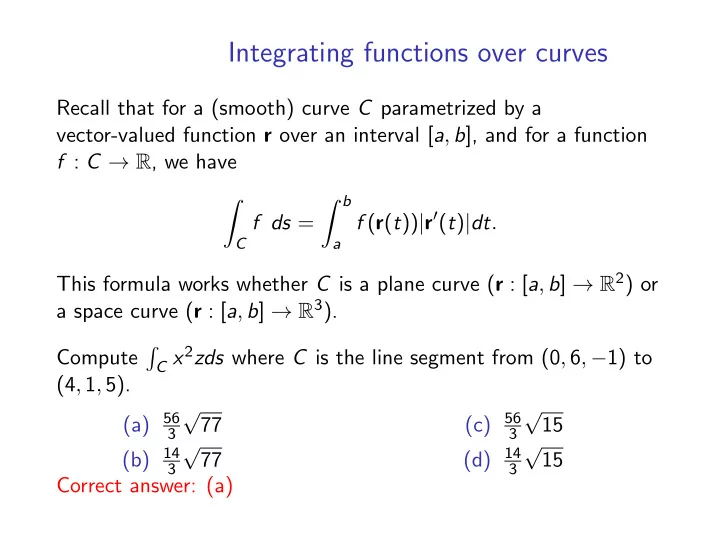

Integrating functions over curves Recall that for a (smooth) curve C parametrized by a vector-valued function r over an interval [ a , b ], and for a function f : C → R , we have ∫︂ b ∫︂ f ( r ( t )) | r ′ ( t ) | dt . f ds = C a This formula works whether C is a plane curve ( r : [ a , b ] → R 2 ) or a space curve ( r : [ a , b ] → R 3 ). ∫︁ C x 2 zds where C is the line segment from (0 , 6 , − 1) to Compute (4 , 1 , 5). √ √ 56 56 (a) 77 (c) 15 3 3 √ √ 14 14 (b) 77 (d) 15 3 3 Correct answer: (a)
Announcements ∙ Midterm 2 is on Tuesday, March 12 at 7pm. • Deadline to request a spot in the conflict exam is next Tuesday, March 5. ∙ Register your i-clicker! Deadline is this Saturday, March 2, at 5pm. • Check on Moodle: if you do not see any i-clicker grades, your registration has not gone through. Email me with your name, i-clicker number, and netid. ∙ Thanks for your feedback. • Changes: bigger chalk, more examples, more slides when possible. • Please continue to provide feedback (by email or anonymously e.g. through your TA).
An example of a vector field https://earth.nullschool.net/
Matching a vector field with its plot (a) F ( x , y ) = ⟨ sin( x ) , 1 ⟩ (b) F ( x , y ) = ⟨ 1 , sin( y ) ⟩ (c) F ( x , y ) = ⟨ 1 , cos( y ) ⟩ (d) F ( x , y ) = ⟨ sin( y ) , 1 ⟩ (e) I don’t know how Correct answer: (b)
Practice with integrating vector fields Let r ( t ) = ⟨ t , t 2 ⟩ , t ∈ [0 , 1], and let F ( x , y ) = ⟨ y , x ⟩ . Sketch the curve and vector field. What can you say about ∫︁ C F · d r ? (a) It’s positive. (b) It’s negative. (c) It’s zero. (d) It’s not defined. (e) I don’t know how to say anything about it. Correct answer: (a)
Practice with integrating vector fields Let r ( t ) = ⟨ t , t 2 ⟩ , t ∈ [0 , 1], and let F ( x , y ) = ⟨ y , x ⟩ (as on the previous slide). ∙ F ( r ( t )) = ⟨ t 2 , t ⟩ . ∙ r ′ ( t ) = ⟨ 1 , 2 t ⟩ . It follows that ∫︂ 1 ∫︂ ⟨ t 2 , t ⟩ · ⟨ 1 , 2 t ⟩ dt F · d r = C 0 ∫︂ 1 3 t 2 dt = 0 = [ t 3 ] 1 0 = 1 . (Note that this is positive.)
Practice with integrating vector fields Let C be parametrized by r ( t ) = ⟨ t , 2 t ⟩ , t ∈ [0 , 1]. Let F ( x , y ) = ⟨ 1 , 2 y ⟩ . ∫︁ What is C F · d r ? (a) 9 (b) 5 (c) 0 (d) 20 (e) I don’t know what to do. (If you’re done, sketch the curve and the vector field, and check whether your answer is a reasonable one.) Correct answer: (b)
Solution: Let C be parametrized by r ( t ) = ⟨ t , 2 t ⟩ , t ∈ [0 , 1]. Let F ( x , y ) = ⟨ 1 , 2 y ⟩ . ∙ F ( r ( t )) = ⟨ 1 , 4 t ⟩ . ∙ r ′ ( t ) = ⟨ 1 , 2 ⟩ . ∫︂ 1 ∫︂ ⇒ F · d r = ⟨ 1 , 4 t ⟩ · ⟨ 1 , 2 ⟩ dt C 0 ∫︂ 1 = 1 + 8 t dt 0 = [ t + 4 t 2 ] 1 0 = 5 .
Recommend
More recommend